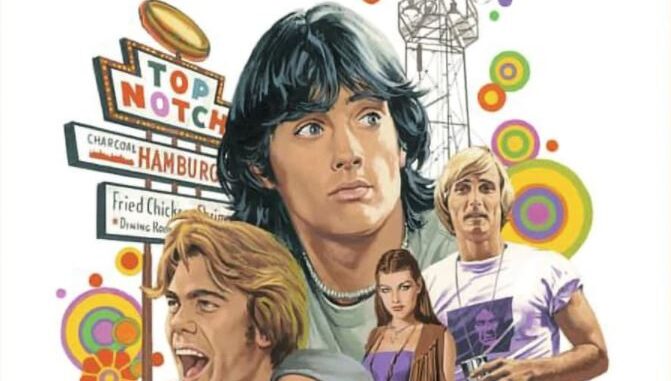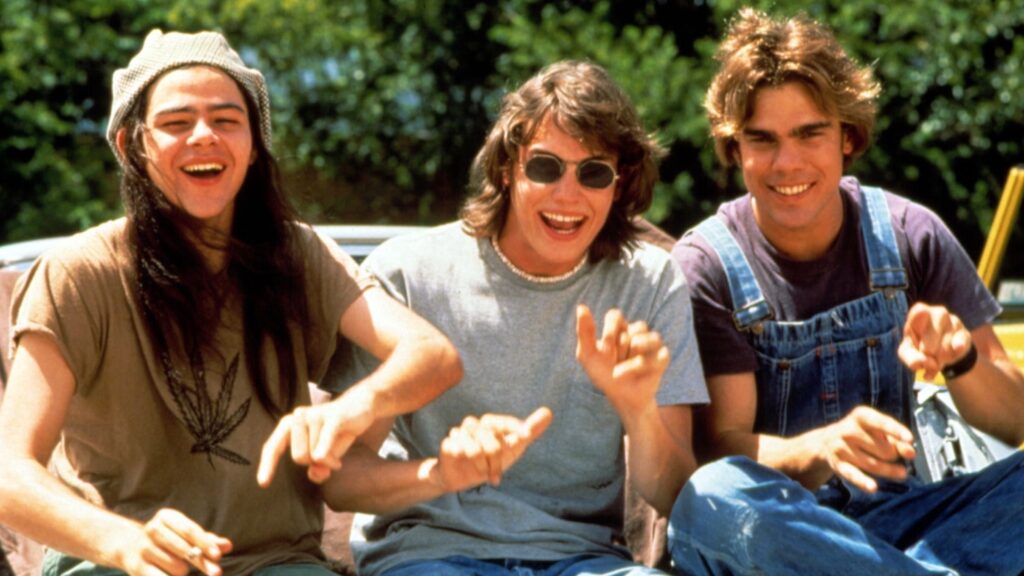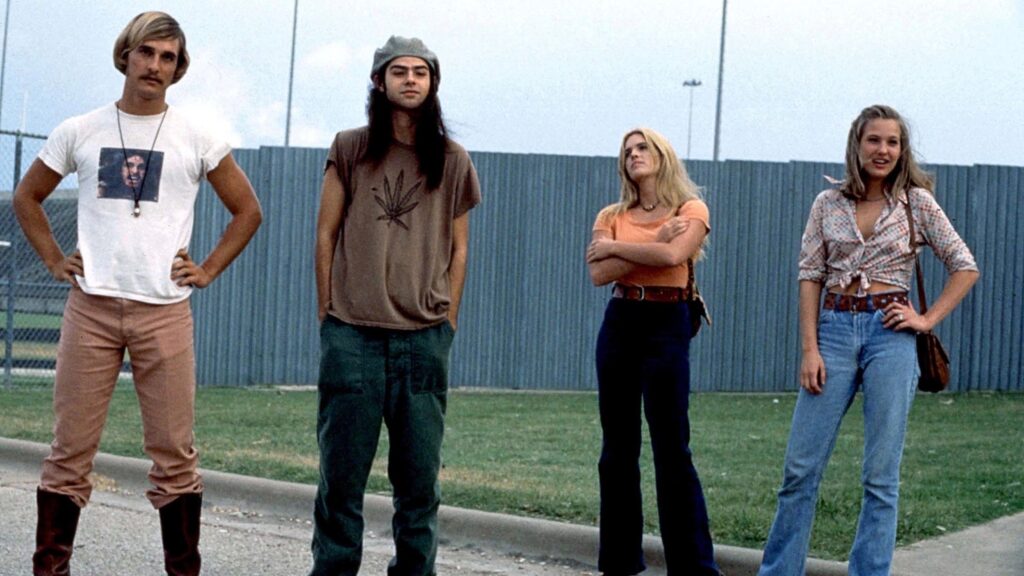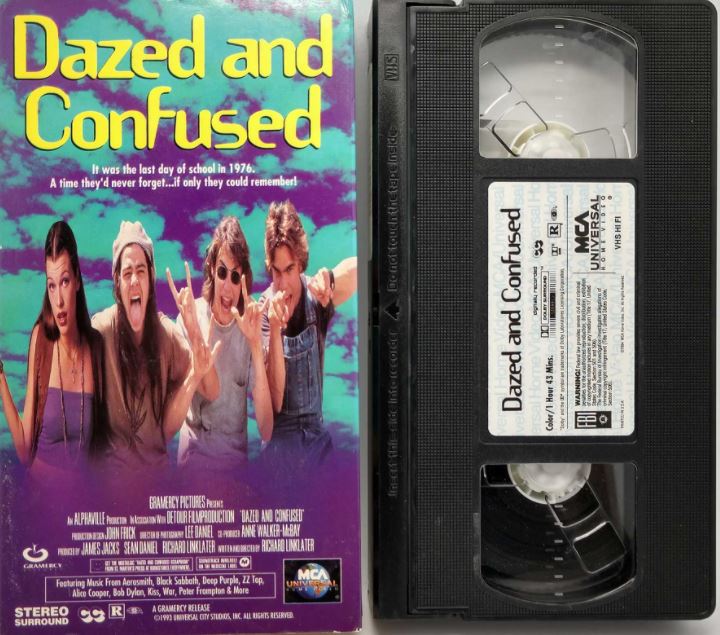
“Staff Picks” is a deeper look into movies that we love here at Video CULTure. Each edition of this column will focus on a single film that we think you should check out, either for the first time or for a long-overdue revisit
By Patrick Bartlett (Twitter: @alleywaykrew)
I know Richard Linklater’s “Dazed and Confused” is often described as a hangout movie and I’ve seen it many times in social settings but it’s a much more important piece of art than can fit into such a small and inconsequential box. I gleaned that from the fact that upon initial viewings, while I watched it with friends who were essentially there to get stoned and act silly along with the characters on screen, I recognized that it was an existential piece of work before I even really know what that word meant. On an basic level, the stakes seem very low but even the slightest bit of closer examination reveals something much larger just beneath the surface.
Admittedly, there isn’t really a plot to speak of. “Dazed and Confused” is about the last day of class in a Texan high school circa 1976 and I guess the best way to describe the story is to say there really isn’t one beyond that. It’s really just about a group of kids, all of whom are in the midst of figuring out where they fit in within their peers and for some of them, it’s about figuring out who they want to be. That’s probably why this movie is evergreen. It’s decades old at this point and when it came out, it was about a time that came decades before but it’s something everyone can relate to. No matter what, you can see yourself in these characters. The main characters in terms of the overall narrative being Jason London’s character of Randy “Pink” Floyd and Wiley Wiggins (yup)’s character of Mitch Kramer. Pink is about to be a senior and is the quarterback of the football team but is much smarter than those characters are generally portrayed on film. He’s also the character who gets along with everyone and therefore manages to unite the disparate cast as the narrative floats between different groups of characters. Mitch is one of the kids moving up into high school, befriended by Pink and subsequently introduced into the rest of the cast of soon-to-be seniors. Both are in the midst of what I guess can only be described as existential crises. Pink is struggling with who he is in the context of who he’s known to be versus who he wants to be, all while railing against his coaches’ authority and their ideas about who he should be and what he should be doing. Mitch, however, is at that moment in life where you’re trying to figure who you are in general. You’re not really a kid anymore, so who are you actually going to end up being? In the end, the arc of both characters is entirely satisfying, even if it’s not ultimately anything operatic or even all that cinematic. It truly means something though, which is why it works as well as it does.

That’s why as low stakes as the film seems on the surface, it means so much to me. The whole cast is great (many of whom went on to varying levels of success in the years that followed) but as someone who first saw this movie when I wasn’t much older than Wiggins’ character and really grew to understand and appreciate it on a deeper level as I got to be around London’s character’s age, it was revelatory. I guess for basically the same reason I was into the music I got into, this is one of the films that made me feel less alone in the world and therefore will always hold a special place in my heart. Yeah, I was never into sports in high school like either of those characters but in every way that matters… I was those guys. As weird as I felt, I could see that someone else like me existed and was going through similar things. I’m sure I’m not the only one that feels that way, but I can’t stress how important to me the climactic scene on the football field was, for instance. To call it a climax might seem antithetical. It’s just kids smoking and talking, sure, but words can’t describe the catharsis I felt watching it for the first time or any time since. It’s a moment that opened my eyes to the world and gave me context to describe how I was feeling in a way that great art should.
That might be Richard Linklater’s greatest gift. The reason that he’s had the career he’s had for as long as he’s had it is not by accident. Not everything he does is a home run but that’s because he’s not really swinging for the fences. His films, like I’ve seen from interviews with Linklater himself, are pretty unassuming. It suggests something slight and possibly superficial, but the majority of the time are some of the best modern examples of film as art. Honestly, Linklater’s work is a big part of how I came to understand art in general. Art isn’t necessarily about what you see as much as what you feel when observing it. At the time that I saw “Dazed and Confused”, I didn’t really know movies like this existed. Kevin Smith’s work was kind of my way in but as much as I truly love the majority of Smith’s work, Linklater’s just hits different, so to speak. Between a film like this or his breakthrough, “Slacker” (which inspired Kevin Smith to be a filmmaker) or his later works… his best stuff is really just about people talking. It doesn’t seem like that should be interesting but they’re probably the films I return to most because of the depth of human connection and feeling that Linklater is able to weave into his work. It’s definitely in his most celebrated stuff, like “Boyhood”, but the way that he manages to nail down exact emotions I’ve felt on so many occasions is why I’ve always connected with his movies on a really fundamental level.

The reason that I watch “Dazed and Confused” annually is because it’s a movie that rewards revisitation. On one level, it allows me to reconnect with these characters and on another, it allows me to reconnect with myself at the different points in my life. It allows me to revisit feelings as much as it allows me to revisit people. These characters feel like friends that I had when I needed them in the same way the film was there when I needed it. If you think about it, it’s mind blowing that it came out from a major studio with real money behind it as basically an attempt to capitalize on nostalgia. Today… hell, even a couple years before or after- it would have been a microbudget rumination on youth released in arthouses like “Slacker” was. I can’t imagine that it would be anything but equally important though. Just like that time in life the movie’s illustrating, it’s unforgettable.

To find out where this film is available to stream, click here: Just Watch
